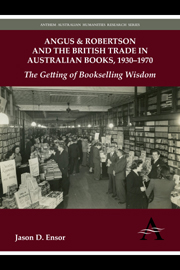 Angus & Robertson and the British Trade in Australian Books, 1930–1970
Angus & Robertson and the British Trade in Australian Books, 1930–1970 Book contents
- Frontmatter
- Contents
- Dramatis Personae
- Preface
- Acknowledgements
- Chapter 1 The Company that Loved Australian Books
- Chapter 2 The Overseas Books in Australian Publishing History
- Chapter 3 Triangles of Publishing and Other Stories
- Chapter 4 The World is Made of Paper Restrictions
- Chapter 5 The First Salesman in London
- Chapter 6 The Getting of Bookselling Wisdom
- Chapter 7 Preparing for ‘Operation London’
- Chapter 8 The Shiralee in the North
- Chapter 9 A Commercial and Cultural Relationship
- Chapter 10 Tomorrow, When London Publishing Ended
- Chapter 11 A House is Rebuilt
- Chapter 12 The Hidden Parts of Publishing Fortune
- Chapter 13 Learning from a Distance
- Figures and Tables
- Notes
- Bibliography
- Index
Chapter 12 - The Hidden Parts of Publishing Fortune
Published online by Cambridge University Press: 05 July 2013
- Frontmatter
- Contents
- Dramatis Personae
- Preface
- Acknowledgements
- Chapter 1 The Company that Loved Australian Books
- Chapter 2 The Overseas Books in Australian Publishing History
- Chapter 3 Triangles of Publishing and Other Stories
- Chapter 4 The World is Made of Paper Restrictions
- Chapter 5 The First Salesman in London
- Chapter 6 The Getting of Bookselling Wisdom
- Chapter 7 Preparing for ‘Operation London’
- Chapter 8 The Shiralee in the North
- Chapter 9 A Commercial and Cultural Relationship
- Chapter 10 Tomorrow, When London Publishing Ended
- Chapter 11 A House is Rebuilt
- Chapter 12 The Hidden Parts of Publishing Fortune
- Chapter 13 Learning from a Distance
- Figures and Tables
- Notes
- Bibliography
- Index
Summary
I think it is in our interests that the British Empire Rights Agreement should continue and we must continue to publish in London.
At the beginning of another period of reorganisation, George Ferguson reassured Walter Butcher that the London office was ‘an essential part of the [Angus & Robertson] publishing operation’ and that it would be ‘maintained in some form though not necessarily in its present form’. With rhetoric that former London executives Hector MacQuarrie, Barry Rowland, Stanley Amor and John Ferguson would perhaps have recognised from years past, Ferguson reinforced the view that as far as general publishing was concerned the London operation was fundamental to Angus & Robertson's ‘retention and attraction of [Australian] authors’, lest the company lose writers to the British publishers whom the London office was selling its books to. It was, in Ferguson's judgement as director of publishing, an essential part of Angus & Robertson's mission and was ‘not regarded as an expendable operation’. Furthermore, in response to a claim made by the new London chief editor Alec Bolton that a ‘profitless prosperity’ was being reflected in ever higher turnovers, record months and then dismal end-of-year final analyses, Ferguson countered in February 1970 that nobody on Angus & Robertson's board actually expected the London office to make a profit.
- Type
- Chapter
- Information
- Angus & Robertson and the British Trade in Australian Books, 1930–1970The Getting of Bookselling Wisdom, pp. 147 - 162Publisher: Anthem PressPrint publication year: 2012
